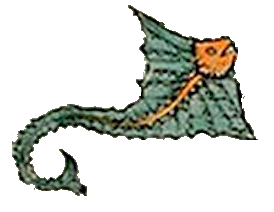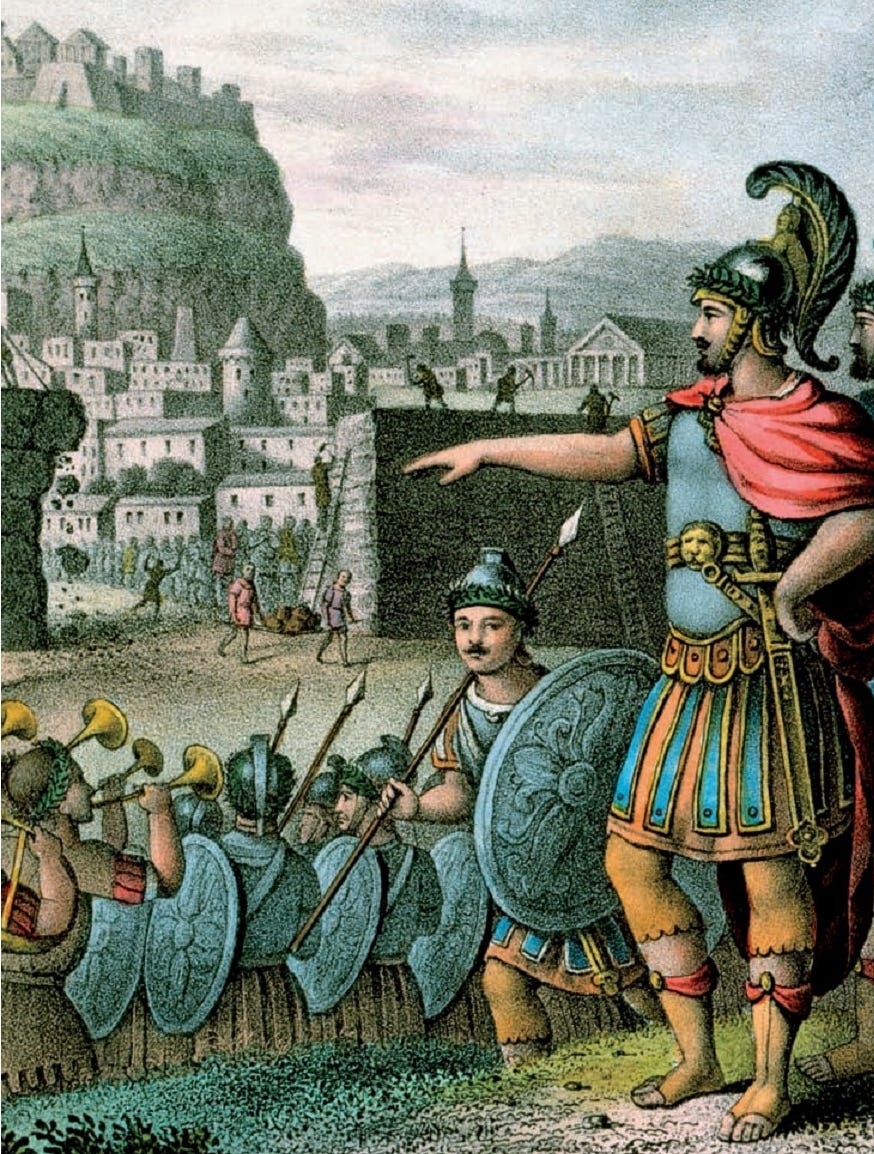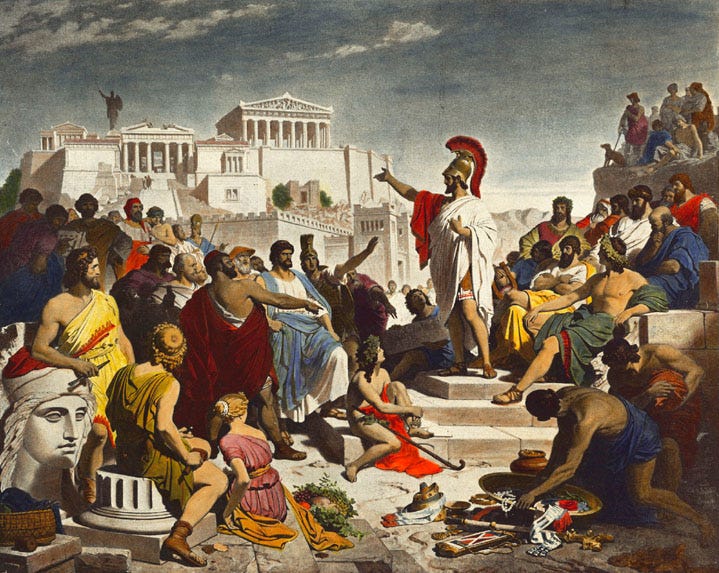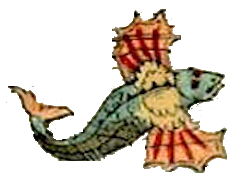The Two Most Tragic Moments in History
AWM #78: Athens, Florence, and the end of the most promising golden ages before modern times 💀
The date is Tuesday, February 7th, 1497. The place is the Piazza della Signoria, the main square in the city-state of Florence, Tuscany.
It is Shrove Tuesday; tomorrow Lent begins. On the occasion, a great bonfire is erected on the piazza. The citizens of the republic are instructed to give up their “vanities” to serve as kindling. In the bonfire go their perfumes, cosmetics, mirrors, jewelry, and dresses, but also any sort of secular entertainment: musical instruments, mythological paintings, and books deemed immoral. The famous painter Botticelli is said — though this is not verified — to have carried some of his own works into the fire.
Those who object to the burning of their possessions are being forced to relinquish them by gangs of piagnoni, or “weepers.” They are the devotees of the charismatic monk who holds power over Florence: Girolamo Savonarola.
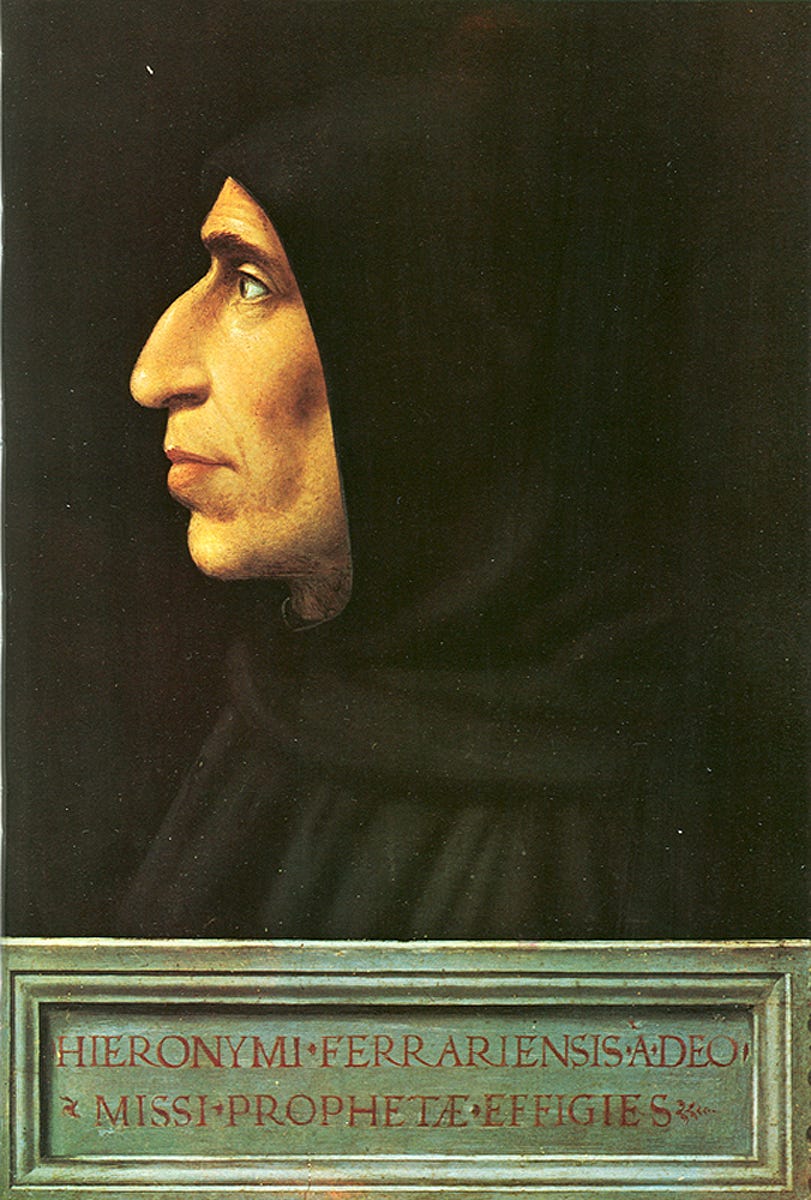
The Bonfire of the Vanities was the climax of a short but consequential episode of Florentine history. The next year, in 1498, Savonarola would be burned at the stake on the very same Piazza della Signoria, after his activities attracted the attention of the pope, who accused him of heresy. But that was after he had led the republic for four years, using his influence to maneuver himself to the top after an invasion by the French. Four years of a theocratic police state that controlled the morals of its citizens and sought a return to the traditional art and culture of the medieval Christianity.
If Savonarola wanted a return, it is because Florence was changing fast. In the 15th century, the small republic was the site of one of the greatest periods of innovation in pre-modern history.
It was the center of the Italian Renaissance. The concept of a Renaissance — a rebirth — points to the rediscovery of ancient civilization, and this the Florentines did: the art and science of the Greeks and Romans were being extensively studied, and the leaders of the city dispatched agents throughout the world to find copies of lost works. Scholars from the fallen Byzantine Empire settled in Italy. Classical architecture became fashionable again.
If that had been all there was to it, it would have been a fairly standard golden age, as such things go. But the Florentines didn’t stop at rediscovery; they soon realized that they could improve on the ancient knowledge.
The Golden Age of Florence was the age of Michelangelo and Botticelli; of Leonardo da Vinci; of Niccolò Machiavelli. There was rapid innovation in the arts, the sciences, and political philosophy. Under the patronage of Lorenzo de' Medici, a banker and ruler of the city for 23 years, the ideas of the ancient world and the new were being remixed into original knowledge, faster than (almost) ever before. A new philosophy, replacing medieval Christian conformism, was developed: humanism. It valued curiosity, good taste, friendship, and intellectual independence. Proposing new ideas was encouraged; so was open criticism.
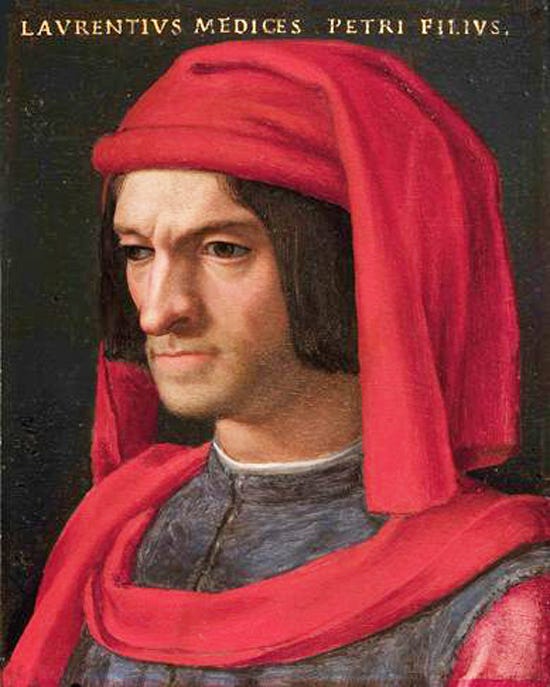
And so Florence in the Renaissance was a rare instance of an optimistic society. It considered its problems to be solvable, and trusted that new ideas would solve them, instead of pessimistically fearing a disruption of the established customs. If its golden age had kept going, and spread beyond Italy, humanity would be far ahead today. We would have solved many more problems, much earlier.
But Girolamo Savonarola, with his prophecies of doom and retvrn to the values of humility and piety, put an end to that. It was the second most tragic moment in history.
The date is April 404 BC. The place is the city-state of Athens, in Attica.
The war between the Delian League, led by Athens, and the Peloponnesian League, led by Sparta, has raged for 26 years. But now it comes to an end: following a great naval battle at Aegospotami, Sparta has destroyed much of Athens’ fleet. Unable to import grain and coordinate its maritime empire, Athens has no choice but to surrender. Lysander, the Spartan general, spares the fallen city from total destruction and enslavement, but he installs an oligarchy of Thirty Tyrants to rule it. The Athenian democracy comes to a close. And with it, the Athenian Golden Age.
The scholars of Renaissance Florence studied the Ancients; much of what they studied came from Athens in the century before its defeat. Just like in Florence, there was a strong ruler who patronized the arts and the sciences: Pericles. Under his leadership, Athens built the Parthenon, one of the greatest architectural wonders of all time. He and his companion, Aspasia, fostered the intellectual milieu that gave us the most important figures of Western philosophy: Socrates and Plato (and eventually Aristotle). Illustrious playwrights, sculptors, historians and physicians lived and worked in the city.
What caused such a creative flourishing? Pericles himself had answers, recorded in the Funeral Oration, a speech he gave in a memorial service to soldiers killed during the Peloponnesian War. Certainly it is a piece of propaganda, but it is an unusual one. It brags in ways that few other cities or kingdoms would have done at the time. For example:
Our city is thrown open to the world, and we never expel a foreigner and prevent him from seeing or learning anything of which the secret if revealed to an enemy might profit him.
Athens did not try to keep its secrets hidden. It was confident in its ability to benefit from an open exchange of ideas. Pericles links much of his city’s success to democracy, which allowed politicians to freely suggest policies and for the people to reject those that didn’t work. He praised the Athenians’ love of freedom, which meant its citizens were able to try new solutions to problems, rather than rely on custom.
As I wrote when I studied the Athenian Golden Age in another essay, “there’s an optimistic quality to the oration. Maybe that’s the most important feature of a golden age — trust in the future, thanks to a prosperous present.”
But as in Florence, it didn’t last. The pro-Sparta Thirty Tyrants established a brutal dictatorship over the city, killing and exiling hundreds of Athenians and seizing their possessions.
It was the triumph of a society that was the polar opposite of Athens. Sparta was a secretive, militaristic, strictly hierarchical state, where any deviation from tradition was punishable. It produced no art or philosophy; we barely hear of any famous Spartans, except for a few generals. This was a society that was entirely devoted to preventing any sort of improvement. It was static.
What would have happened, if the static and pessimistic version of Greek civilization hadn’t conquered the dynamic and optimistic one? Athens would have kept solving problems. It would have grown powerful, thanks to trust in open-ended progress. And humanity would have advanced far faster than it did.
And that’s why its defeat to Sparta was, quite possibly, the single most tragic moment in history.
In his book The Beginning of Infinity, the physicist David Deutsch asserts that all knowledge is created by a process of conjecture followed by criticism. When there’s something you don’t understand, you try to come up with explanations. Then you reject them if they don’t match reality, or if they explain too much and match reality even when you vary them. Over time, only the best explanations survive.
This process requires certain conditions in a culture, most notably that people should be able to criticize and reject ideas. But this is difficult for societies to accept. Communities always want to preserve their memes, whether religious, political, or intellectual. Nothing comes more naturally to humans than creating taboos, orthodoxies, and reverence to tradition in order to protect their ideas. In almost every society from the earliest hunter-gatherer tribes to the most powerful empires, heterodoxy is discouraged, when it isn’t outright punished.
(I’m not against tradition, mind you. A lot of illegible cultural evolution is embedded in ancient customs, and discarding that can be dangerous. But it’s bad if a tradition cannot be criticized. It has to be able to fend for itself. It has to survive because people see the value in it, not because of blind conformity.)
There has been one tremendous exception to the above trend, according to Deutsch: Western civilization, beginning with the Enlightenment and Scientific Revolution, around the end of the 17th century.
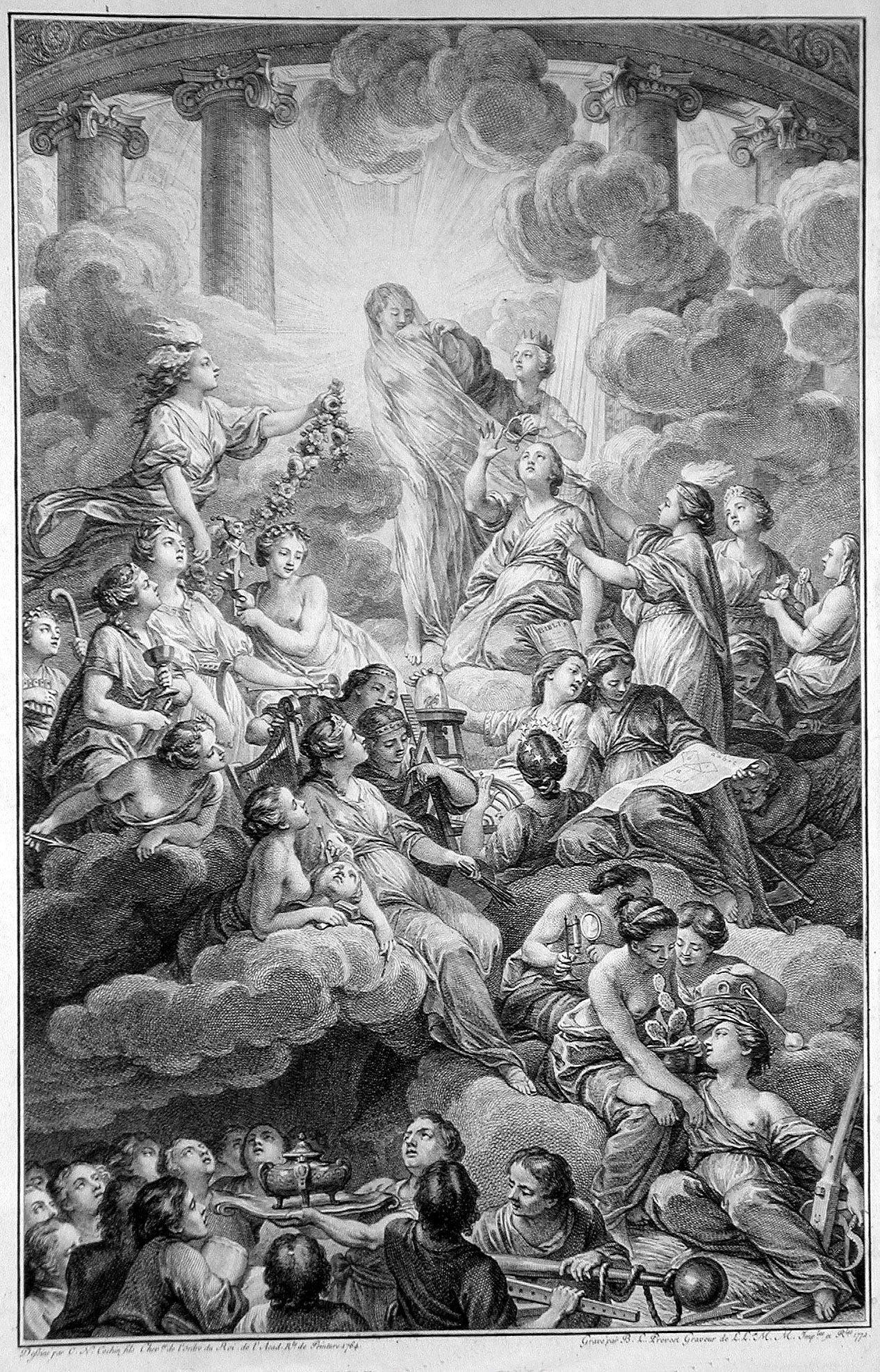
The Enlightenment is what has enabled the fast progress in technology and science in the past 300 years or so. It has enabled new experiments in governance, with the rise of liberalism and modern democracy. It has enabled a flourishing of the arts that would have been difficult to comprehend for medieval or ancient people. It has sown the seeds of the industrial revolution. None of this could have happened if human creativity had been stifled by the weight of tradition, as it (almost) always did before. No growth of knowledge in all these spheres would have been possible if taboos and orthodoxies had shielded scientific, political, and aesthetic ideas from criticism.
It is extremely fortunate that this golden age, which began in northern Europe (and Florence, with Galileo), has not stopped. We are still in it. And it has spread to the non-Western world, for the most part. This means that we are, Deutsch believes, at the beginning of an infinity: as long as our civilization does not collapse into stasis or extinction, we will make progress forever. That is, we will solve problems forever, including the problems brought by the solutions to previous problems.
The Enlightenment, in other words, was the spark of a great process. It was the only one that caught on. Athens and Florence were the two that came closest — but they ultimately failed.
There were probably countless other “mini-Enlightenments,” as Deutsch puts it. The Islamic golden age, in the 7th to 13th centuries, may have been one, but it’s not clear that it involved a tradition of criticism. At the scale of single individuals, there have been people like Roger Bacon, the medieval English philosopher who is sometimes credited with being an early proponent of the scientific method. There were surely many like him, most of whom left no record and none of which influenced a whole culture.
Beyond these examples, I’m also thinking of the Hellenistic world, with places like Alexandria and Seleucia, which might have undergone a “forgotten revolution”; or of periods of scientific innovation in non-Western cultures, such as India and China, which I know little about. Perhaps it would be worth digging; we might find more mini-Enlightenments and learn something interesting. But we know that we won’t find any that lasted. Otherwise the effects would be visible today.
None of this is to say that inventions and discoveries have not happened in any cultures besides ancient Greece, Renaissance Italy, and modern Western Europe. They did — but (almost) always at a slow pace. Fast innovation can only come from a tradition of creativity combined with criticism, and, maybe most importantly, of trust in problem-solving and the growth of knowledge. This seems to have been historically rare.
Paradoxically, the authoritarian regimes over Athens and Florence were very short-lived. The Thirty Tyrants were overthrown after less than a year, and Athenian democracy and independence were restored. Savonarola, as we saw, was burned at the stake after four years of dictatorial theocracy, and the Medici returned to power.
Yet, both Athens and Florence became unremarkable after their respective restorations. They kept contributing to the arts and sciences, but at the same slow rate as in any other city or state. There was no more open-ended progress. There was no more trust in the future.
They lost their potential — and that’s why, out of all the atrocities and disasters that have befell humanity, these two are the most tragic. If things had played out differently in either, we might have been, as Deutsch puts it, “exploring the stars by now, and you and I would be immortal.”
Thanks to the Enlightenment, we’ll get there, eventually. At least, we will if our own golden age sustains itself.
The lesson from Athens and Florence is that optimism is somewhat fragile. A relatively small disturbance can make people retreat into orthodoxy and tradition. Is our Enlightenment resilient enough to keep going in such an event? It seems reasonable to hope so. Even if a nuclear war wiped out most of the population, there would probably be enough philosophy of science and historical documents for the remaining people to kickstart another golden age.
But then again, maybe not. Or maybe it would take a long time for the process to start again — just like it took two thousand years for ancient Greek ideas to be fully rediscovered in the West.
And perhaps the disturbance doesn’t have to be as large as nuclear winter. Orthodoxy can take many forms. Taboos still exist in our liberal societies; if they grow in importance, and people become careful with everything they say, then creativity is stifled. Pessimistic ideas like the precautionary principle can make us too shy to take risks and thereby find new solutions to problems. Overly conservative1 or fundamentalist ideologies can protect bad ideas from criticism and prevent us from rejecting them. Versions of environmentalism that rule out the use of technology can make us lose trust in our capacity for improvement.
The proponents of these ideas often prophesy doom, like Savonarola once did. If we’re not careful, and let them win, then these prophecies might self-fulfill. And that would be a catastrophic loss of potential.
We must allow the modern-day Savonarolas and Spartas to exist and make their prophecies, because we are open societies that rely on creativity and freedom. But we must criticize them relentlessly. We must not let them bring forth a third tragic moment of history.
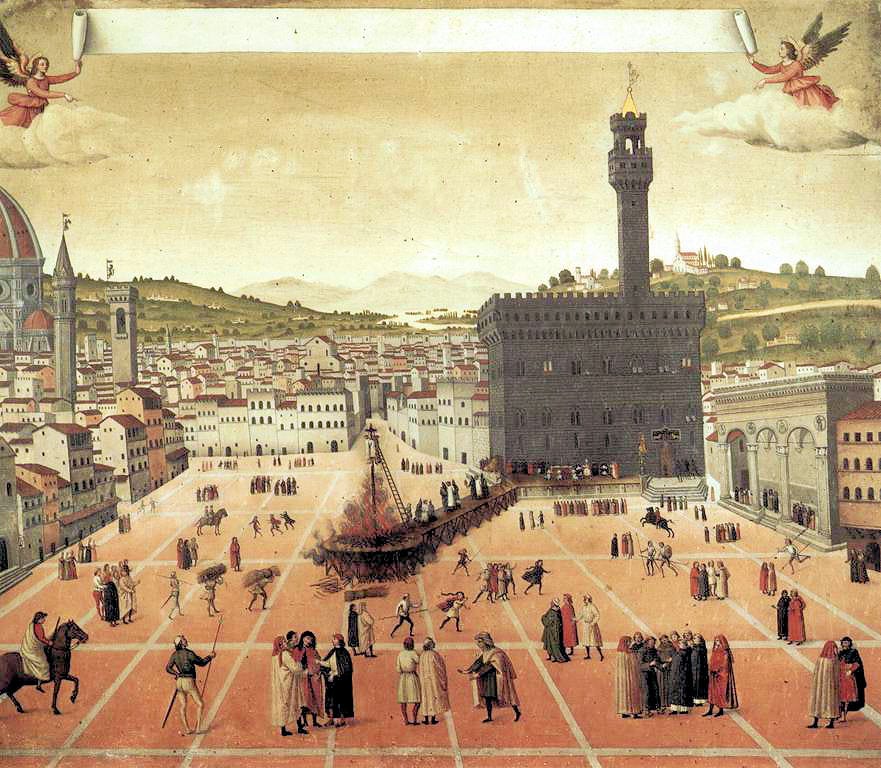
“Conservative” in a philosophical sense. In real-life politics, “conservatism” may be orthodox, but it may also be progress-oriented if it tries to find solutions to problems. The same is true of “progressivism,” which sometimes promotes anti-progress ideas.



